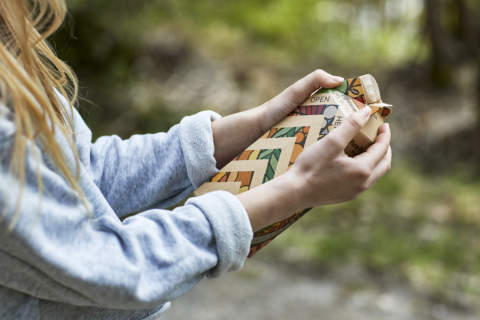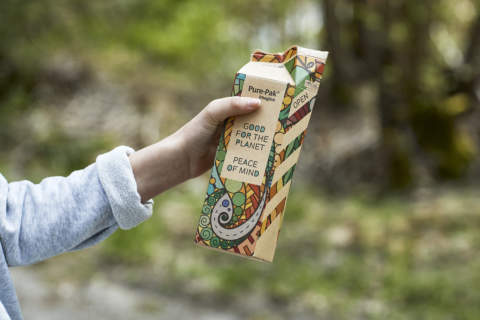The Pure-Pak® Imagine carton
No need to imagine the most sustainable carton – it’s here! Pure-Pak® Imagine is our most environmentally friendly carton to date. It is a modern version of our original Pure-Pak® carton – designed with an easy open feature. The natural solution to the global need to reduce the usage of plastic bottles
Beverage cartons already have the lowest carbon footprint among liquid food packaging today*. Using renewable, recyclable and sustainably sourced materials, this innovative packaging solutions offer a natural and convenient alternative to plastic bottles and fit with a low carbon circular economy. This carton uses wood-based renewable plastics, rather than relying on petroleum-based plastics.
The Pure-Pak® Imagine carton has no plastic screw cap and is 100% forest based made with Natural Brown Board. The carton is fully renewable and carbon neutral, creating the perfect low carbon, circular economy approach.
10 times
less plastic than a PET bottle
46%
less plastic than a carton with closure
100%
based on wood
Many will recognize the easy-to-open feature from the 70’s and 80’s before the screw cap was first introduced. The Pure-Pak® Imagine carton’s unique top fin helps guide consumers how to open he carton. In combination with the modern functionality of the easy-pour and easy-fold features, the new carton design sets a new benchmark in reducing plastics.

Shape is the first recognition point for consumers, so this is especially important in markets less familiar with the easy opening feature. The design of the Pure-Pak® Imagine carton will create recognition on shelves across our markets and is applicable to all fresh categories.
We aim to help consumers make conscious environmental choices. The carton’s easy opening gives the environmentally-minded consumer a more sustainable pack, with less plastic and more natural renewable materials.
*Lifecycle assessments comparing one litre packaging for fresh milk have shown cartons to be 83% more climate friendly than PET and 77% better than reusable glass (2015/16 study by IFEU Institut für Energie- und Umweltforschung Heidelberg GmbH, www.ifeu.de).


